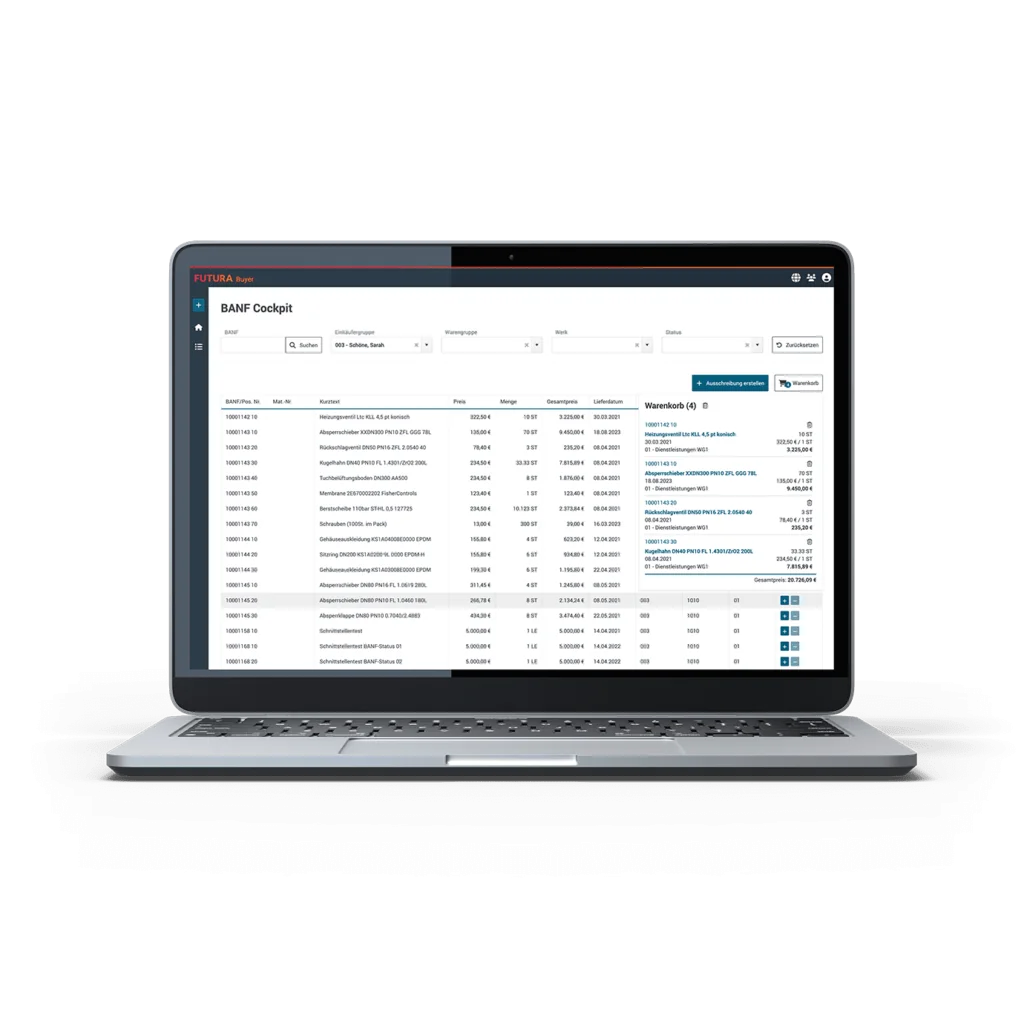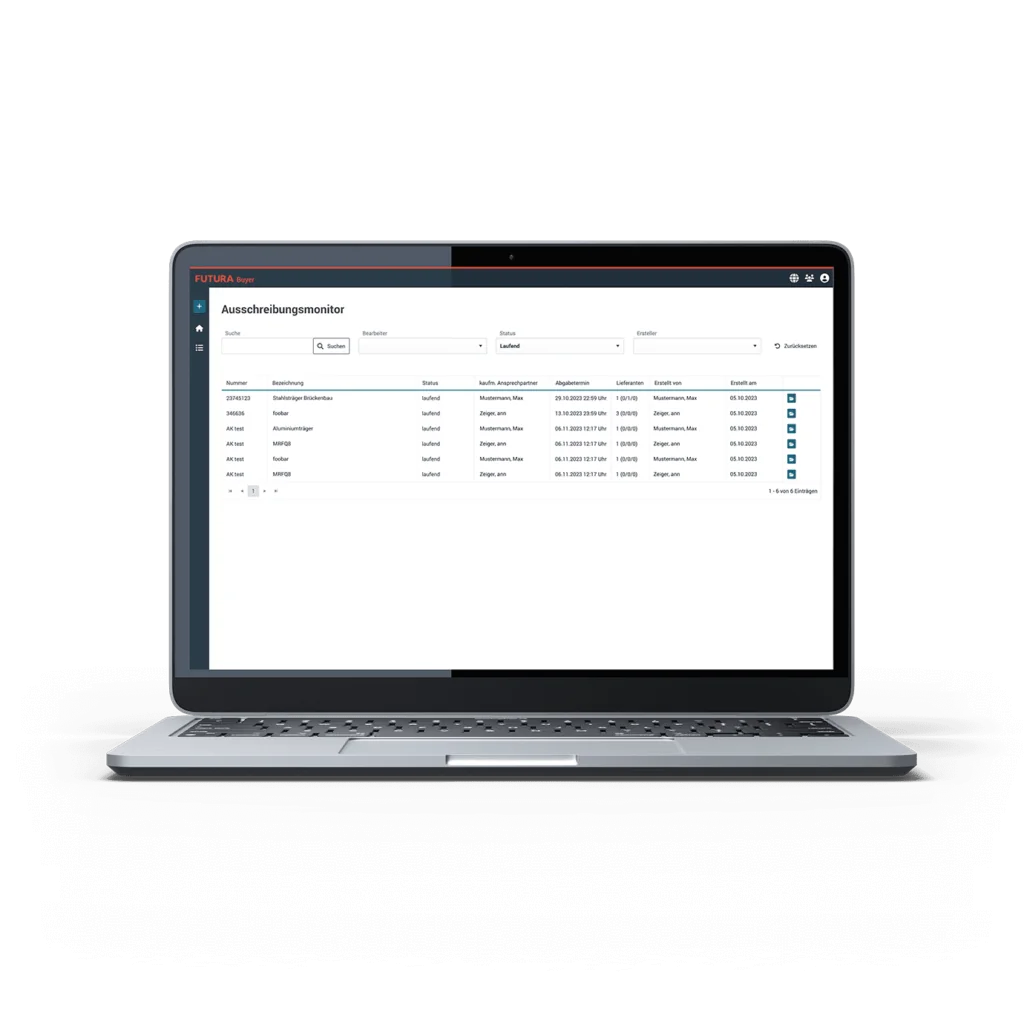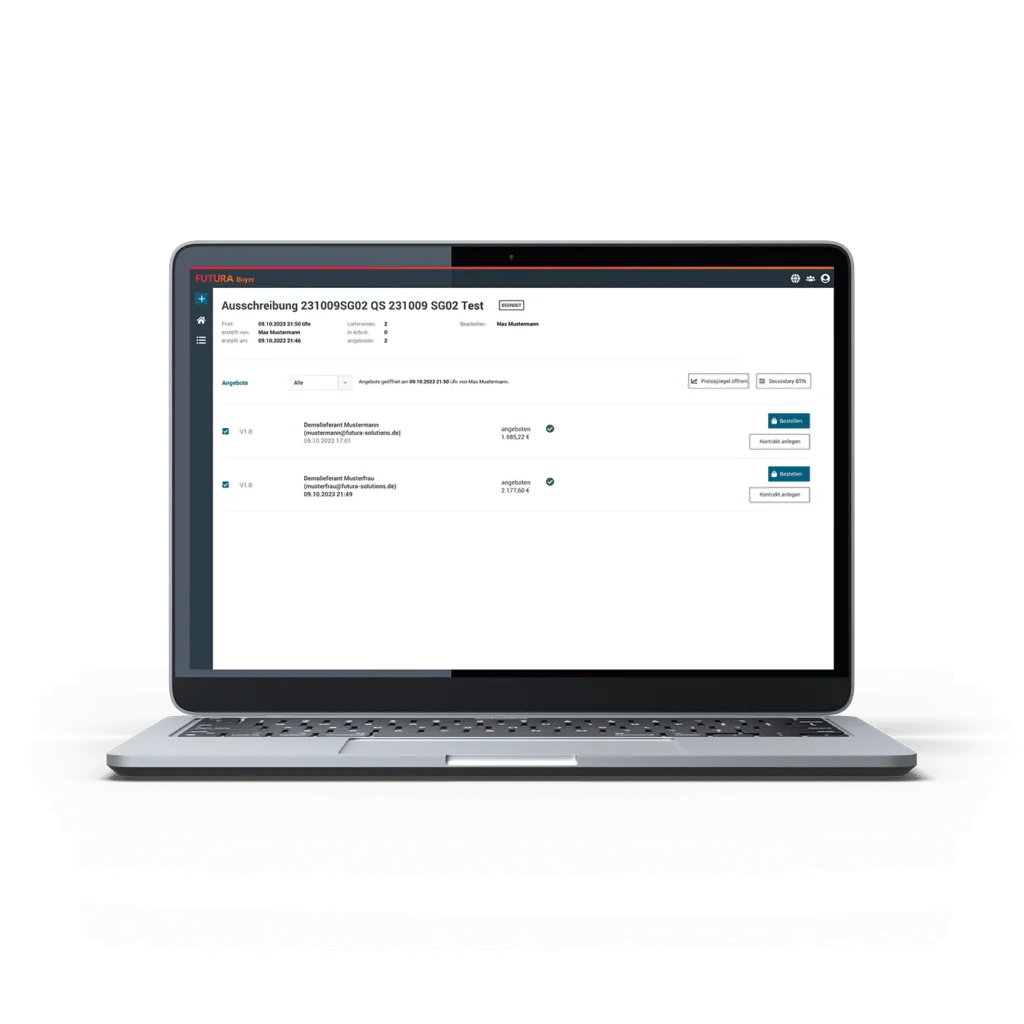
Harmonize, simplify, accelerate sourcing processes
You are looking for an extremely flexible solution that can be implemented quickly and adapts to your successfully established processes in S/4HANA – and not the other way around. Preferably with only one system for all purchasers to log on to in the morning: Your SAP system. Provide your purchasing teams with the necessary customized tools to streamline operational purchasing processes and significantly strengthen your strategic purchasing at the same time with the FUTURA Smart Sourcing module.
- Save scarce resources by automating manual processes
- Make fact-based sourcing decisions
- Achieve precise cost control and savings
- Respond faster in the event of supply bottlenecks
- Strengthening supply security through proactive purchasing strategies
FUTURA factors of success
More savings
Save valuable time and thus money in the form of process costs with, for example, multistage sourcing and (multistage) digital negotiation rounds based on game-theoretical strategies.
Higher transparency
Always know the status of the project: All sourcing processes are documented in the system in a traceable and audit-proof manner. And in real time in your own SAP system. No system discontinuities, no shadow systems.
Higher user acceptance
SAP SSO, bundling of all activities via SAP Launchpad and intuitive workflows – this is how you get all SAP purchasing teams on your side. Better data quality, better quality of your purchasing decisions and better purchasing results.
Bye-bye, click-click! Support for operational purchasers in day-to-day business
Your operational purchasers are simply faster in the SAP system – relaxed with single sign-on. This means they can work in their familiar system environment, usually the SAP Launchpad, without any training.
Since this solution ensures data sovereignty in your SAP system, you can further automate and accelerate your operational purchasing processes with high data quality through flexibly coordinated smart functions, such as the so-called purchase requisition cockpit, the request monitor and the order monitor.

FUTURA purchase requisition cockpit
Challenge
Quickly and easily search for purchase requisitions, select them and transfer them to a request.
Solution
Simple, fast and clear filtering, selection and transfer of purchase requisitions into a request. Direct assignment of suppliers from SAP, your address book and/or FUTURA Supplier Network.
Advantages
More certainty that all purchase requisitions are processed due to the better overview. In addition, time savings thanks to seamless integration instead of time wasters due to system discontinuities.
FUTURA RfQ Monitor
Challenge
Track requests, identify supplier activity, and modify requests
Solution
Complete overviews of all requests, react quickly to activities of your suppliers, receive questions and send replies and messages.
Advantages
All purchasing and requesting processes at a glance. No matter from which source – one view for everything. Easily modify your requests and add new suppliers.


FUTURA offer monitor
Challenge
Opening quotations, viewing them in a price comparison list and negotiate with suppliers.
Solution
Defining negotiation teams and approvers, opening offers (closed requests) as well as evaluating and negotiating with suppliers. Start new request rounds or auctions, approve, issue and create purchase orders and/or contracts in SAP.
Advantages
All offers, regardless of the request process, at a glance. Automated offer evaluation in the price comparison list, with all the information provided by the supplier. Implement the best purchasing strategy: Personal negotiation, new request round or transfer to the appropriate auction type, editing and tracking in the eAuction Monitor.
Identifying opportunities – higher value contributions from strategic purchasers
Cost optimizing and risk mitigation have long been the leading value drivers for procurement – in the future, however, speed of execution and insights will play a central role. In this context, continuously enhanced functions in Core S/4HANA Sourcing & Procurement together with FUTURA Smart Sourcing form an ideally tuned combination.
Requests, bundling of volumes or consolidation of expenditures, negotiation of contracts and conditions – purchasers can rely on FUTURA for all these strategic sourcing tasks. Combined with a high level of usability, this ensures that strategic purchasers are highly motivated to make optimal use of FUTURA Smart Sourcing, just as operational purchasers are.
FUTURA contract cockpit
Challenge
Track contract schedules, search, select, and issue requests for contracts.
Solution
Read out contracts in SAP including the contract items for quoting. View durations of contracts and copy the end of the term to the purchasing calendars.
Advantages
More reliability through better monitoring of contracts and time savings when creating requests from contracts.
FUTURA eAuction monitor
Challenge
Including offers in electronic negotiations via auction or creating auctions with default prices.
Solution
Turning a request into an auction after the end of the term – either with selected suppliers or with all suppliers. Offers are included in the auction as individual starting prices. Optional: Suppliers can optionally see their ranking. Award via the lowest bid.
Advantages
Higher procurement cost savings by taking advantage of the competitive situation and applying game theory.
FUTURA Savings Monitor
Challenge
Identify and track potential savings.
Solution
Identify negotiated savings potential. Tracking extends from the original planned or calculated costs or budget values, through the first and subsequent offers, through to a possible auction.
Advantages
Higher procurement cost savings by taking advantage of the competitive situation and applying game theory.